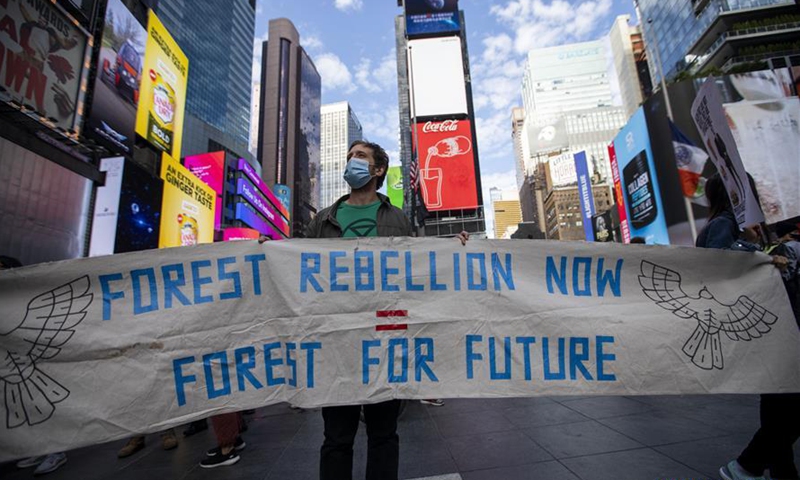In SUVs and on planes, richest 1% drive climate-heating emissions
Source: Reuters Published: 2020/9/21 18:23:40

A man takes part in a climate change protest in Times Square in New York, the US, on unday. Photo: Xinhua
Prone to frequent flying, a passion for SUVs and big spending, the richest 1 percent of the world's population produced twice as many planet-heating emissions as the poorest half of humanity over the last quarter-century, researchers said on Monday.
That excessive consumption has left little room in the world's "carbon budget" for poorer countries to grow without pushing the planet into increasingly dangerous climate impacts, from worsening storms to water shortages, scientists said. And it suggests that keeping global climate change under control will require not just helping poorer countries to develop cleanly, but putting in place tough measures to curb over-consumption by the world's rich, they said in a new study.
Tim Gore, head of climate policy for anti-poverty charity Oxfam and lead author of the report, said change would not come from individuals voluntarily acting alone.
"That will never add up. This has to be driven by governments," he said.
The research, carried out with the Stockholm Environment Institute, found that over the 25 years between 1990 and 2015, the richest 1 percent of people drove 15 percent of climate-changing emissions - more than twice the 7 percent emitted by the poorest half.
The richest 10 percent accounted for 52 percent of emissions over that period, the study said. The growing popularity of fuel-guzzling SUVs was a particular problem, with the vehicles emerging as the second-biggest driver of global growth in carbon emissions between 2010 and 2018, it said.
As countries now look to recover from economic downturns linked to the COVID-19 pandemic, revamping economic incentives to discourage excessive consumption could play a role, officials said.
"Our current economic model has been an enabler of catastrophic climate change and equally catastrophic inequality," said former United Nations secretary-general Ban Ki-moon.
The Oxfam report estimates that the richest 10 percent of people would have to slash their emissions to about 10 times lower than now to keep the world on track for the goal - and do it by 2030.
"This is the moment to be bold and do things differently," Gore said.
Posted in: CROSS-BORDERS